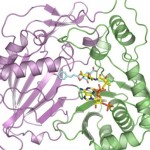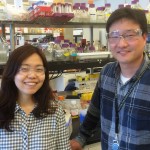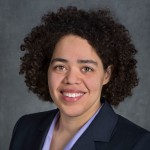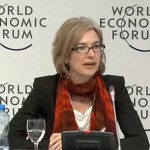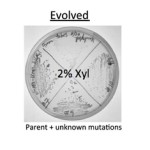Aymerick Eudes and Dominique Loqué of the Joint Bioenergy Institute (JBEI) led a study that shows for the first time that an enzyme can be tweaked to reduce lignin in plants. Their technique could help lower the cost of converting biomass into carbon-neutral fuels to power your car and other sustainably developed bio-products. The crystal structure of this enzyme was solved using data collected in the Berkeley Center for Structural Biology at the Advanced Light Source. Read more on the Berkeley Lab News Center.
JBEI Invention Leads to More Efficient Biofuel Production for Industrial Application
New Biosynthesis Pathways for Five-Carbon Alcohol from Mevalonate Are Available For Licensing
Researchers at the U.S. Department of Energy (DOE)’s Joint BioEnergy Institute (JBEI) have developed two novel biosynthesis pathways for five-carbon alcohol (isopentenol or 3-methyl-3-buten-1-ol) from mevalonate that reduce the energy demand and cost of earlier applications of the mevalonate pathway by using genetically engineered host cells, whose culturing stage can happen both in anaerobic or aerobic conditions. This invention can be used in an industrial scale, even under oxygen-limited conditions. These modified pathways would be a good platform for industrial production of isopentenol which is a potential gasoline alternative and a precursor of commodity chemicals such as isoprene. Read more on the JBEI website.
“The Tale of the Bacteria Farmer” with JBEI’s Sarah Richardson
JBEI’s Post-Doctoral Researcher Sarah Richardson (Biological Systems and Engineering Division) teamed up with Team Escamilla at Tumble to record a science podcast for children ages 8 – 12, created to be enjoyed by the entire family. In this podcast episode Richardson explains how she’s trying to convince bacteria to make the things we need, such as biofuels. To listen click here. To learn more about Sarah’s research area and her outreach work click here.
Biosciences Area Scientists Participate in World Economic Forum
Faculty biochemist Jennifer Doudna and Biosciences Area Associate Laboratory Director Jay Keasling attended the World Economic Forum in Davos, Switzerland, last week, to bring their unique perspectives to world leaders. Both researchers were named to Al Aribya’s “45 top scientists at Davos you should know about” list.
Breaking the Xylose Bottleneck
Xylose utilization remains the primary bottleneck in fully using the renewable plant biomass. In a Nature Scientific Reports paper entitled, “Evolved hexose transporter enhances xylose uptake and glucose/xylose co-utilization in Saccharomyces cerevisiae,” Biological Systems & Engineering Division researchers at Joint BioEnergy Institute (JBEI) Amanda Reider Apel and Aindrila Mukhopadhyay report the discovery and characterization of a yeast sugar transporter variant with superior Vmax (uptake rates) for xylose. This discovery will be valuable in developing biomanufacturing strains that can use the full set of sugars generated from plant biomass. Read more on the JBEI website.
- « Previous Page
- 1
- …
- 55
- 56
- 57
- 58
- 59
- …
- 62
- Next Page »
Was this page useful?


